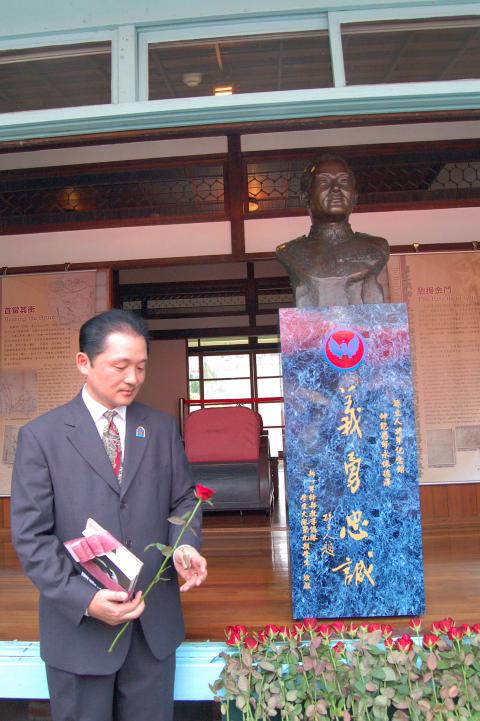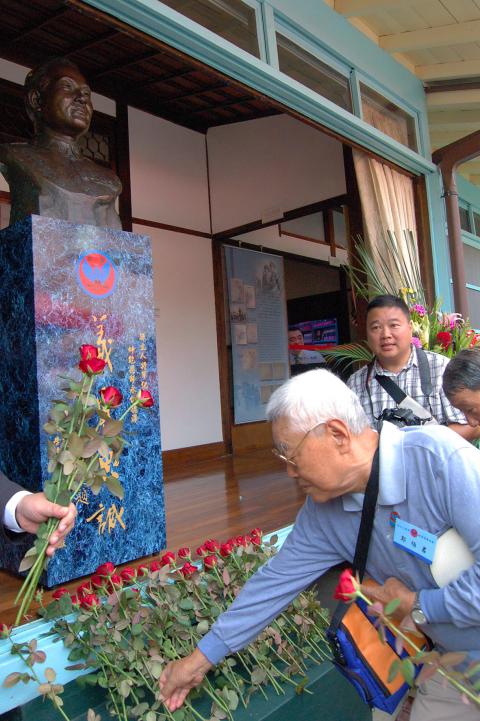Soldiers and staff formerly under the command of General Sun Li-jen (孫立人) gathered on the eve of the Mid-Autumn Festival to attend the opening ceremony of the Sun Li-jen Memorial Hall in Taipei on Saturday.
Sun, called the “Rommel of the East” by his Western counterparts, was present in many of the battles of the Second Sino-Japanese War, including the Republic of China’s (ROC) military deployment in the so-called China-Burma-India theater, winning acclaim for providing relief to British forces in the region and re-establishing the Ledo Road, the alternative to the Burma Road, which was the primary supply route of the ROC’s Western allies before it was cut off by Japanese forces.
Erwin Rommel was a German general who participated in both World Wars and is most recognized for his desert warfare tactics in Nazi Germany’s North African campaign — fought primarily between the British Commonwealth and Axis allies Germany and Italy.

Photo: Su Meng-chuan, Taipei Times
On the eve of the Mid-Autumn Festival 65 years ago, Sun led the officers of the New 1st Army of the Nationalist Forces to Taiwan, relocating a training center to the island in an effort to train more troops for the ongoing civil war between the Chinese Nationalist Party (KMT) and the Chinese Communist Party.
One of the members of this force, 85-year-old Teng Hsueh-jui (鄧雪瑞), said that when they were training in northeastern China, Sun had always striven to make sure they had enough hot water to bathe with and leather coats to ward off the cold, adding that the general treated his soldiers just as he would his family.
“If it had not been for the general, we [the officers under his command] would not have been able to make a life in Taiwan,” Teng said.

Photo: Su Meng-chuan, Taipei Times
To commemorate the general, the soldiers under his command collected funds to make a bronze statue of him — cast by artist Wang Hsiu-chi (王秀杞) — and donated it to the Sun Li-jen Museum, located in the house in which Sun had been kept under house arrest for 33 years.
In 1955, Sun was relieved of his command by former ROC leader Chiang Kai-shek (蔣介石) due to allegations that he was planning a mutiny and sheltering Communists, and he was kept under house arrest until the order was remanded by then-president Lee Teng-hui (李登輝) in 1988. However, Sun was only able to enjoy his freedom for two years before passing away in 1990.
His second son, Sun Tien-ping (孫天平), said on Saturday that his father often said he had never done anything that he regretted, but he did feel apologetic toward his former subordinates.
“I wish to thank everyone for not giving up on my father and even collecting funds to make a statue in his honor,” Sun Tien-ping said, adding that he firmly believed “justice and history would restore the truth of the matter.”
Taipei City Hall has registered Sun’s residence as a historic heritage site and, with the agreement of Sun’s family, has turned the house into a memorial museum, which is open on the second and fourth Sunday of every month.

‘DENIAL DEFENSE’: The US would increase its military presence with uncrewed ships, and submarines, while boosting defense in the Indo-Pacific, a Pete Hegseth memo said The US is reorienting its military strategy to focus primarily on deterring a potential Chinese invasion of Taiwan, a memo signed by US Secretary of Defense Pete Hegseth showed. The memo also called on Taiwan to increase its defense spending. The document, known as the “Interim National Defense Strategic Guidance,” was distributed this month and detailed the national defense plans of US President Donald Trump’s administration, an article in the Washington Post said on Saturday. It outlines how the US can prepare for a potential war with China and defend itself from threats in the “near abroad,” including Greenland and the Panama

A magnitude 4.9 earthquake struck off Tainan at 11:47am today, the Central Weather Administration (CWA) said. The hypocenter was 32.3km northeast of Tainan City Hall at a depth of 7.3km, CWA data showed. The intensity of the quake, which gauges the actual effect of a seismic event, measured 4 in Tainan and Chiayi County on Taiwan's seven-tier intensity scale, the data showed. The quake had an intensity of 3 in Chiayi City and County, and Yunlin County, while it was measured as 2 in Kaohsiung, Nantou County, Changhua County, Taitung County and offshore Penghu County, the data showed. There were no immediate reports of

The Chinese Nationalist Party (KMT) is maintaining close ties with Beijing, the Democratic Progressive Party (DPP) said yesterday, hours after a new round of Chinese military drills in the Taiwan Strait began. Political parties in a democracy have a responsibility to be loyal to the nation and defend its sovereignty, DPP spokesman Justin Wu (吳崢) told a news conference in Taipei. His comments came hours after Beijing announced via Chinese state media that the Chinese People’s Liberation Army’s Eastern Theater Command was holding large-scale drills simulating a multi-pronged attack on Taiwan. Contrary to the KMT’s claims that it is staunchly anti-communist, KMT Deputy

RESPONSE: The government would investigate incidents of Taiwanese entertainers in China promoting CCP propaganda online in contravention of the law, the source said Taiwanese entertainers living in China who are found to have contravened cross-strait regulations or collaborated with the Chinese Communist Party (CCP) could be subject to fines, a source said on Sunday. Several Taiwanese entertainers have posted on the social media platform Sina Weibo saying that Taiwan “must be returned” to China, and sharing news articles from Chinese state media. In response, the Mainland Affairs Council (MAC) has asked the Ministry of Culture to investigate whether the entertainers had contravened any laws, and asked for them to be questioned upon their return to Taiwan, an official familiar with the matter said. To curb repeated